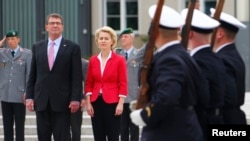U.S. Defense Secretary Ash Carter said Tuesday the U.S. will pre-position about 250 tanks, Bradley infantry fighting vehicles and self-propelled howitzers in eastern and central Europe in a move meant to reassure NATO allies unnerved by threats seen from Russia and terrorist groups.
Carter, during a trip to Tallinn, said the Baltic states – Estonia, Lithuania, Latvia – as well as Bulgaria, Romania and Poland agreed to host elements of the military equipment. Some of the equipment would also be located in Germany.
The amount of equipment that would be stored in each country would be enough to supply either a company, which would be enough for about 150 soldiers, or a battalion, enough for about 750 soldiers.
"We will temporarily stage one armoured brigade combat team's vehicles and associated equipment in countries in central and eastern Europe," Carter said at a joint press conference with three Baltic defense ministers.
He said the equipment could be moved around the region for training and military exercises.
The equipment, along with the commitment of resources for NATO's high-readiness task force, would be part of a two-pronged U.S. plan meant to underscore America's commitment to helping allies counter the growing threats on Europe's eastern and southern fronts.
Russian reaction
A Russian defense ministry official said stationing tanks and heavy weapons in NATO states on Russia's border would be the most aggressive U.S. act since the Cold War.
President Vladimir Putin announced Russia would add more than 40 intercontinental ballistic missiles to its nuclear arsenal this year.
Carter has condemned Russia's "loose rhetoric" involving nuclear arms.
On Monday, Carter said the United States "will not rely on the Cold War playbook" in dealing with Russia, but instead will rely on a combination of military and non-military tools to counter Russian aggression in Ukraine.
Carter spoke in Berlin Monday before traveling to Estonia for meetings with the defense ministers of Estonia, Latvia and Lithuania, which were forcibly incorporated into the Soviet Union.
He said there is neither a desire for a return to a Cold War nor for a new, active conflict with Russia, and that economic sanctions on Russia are having the desired effect of imposing economic hardship on Moscow.
NATO meeting
Carter will meet with NATO defense ministers Wednesday and Thursday in Brussels to discuss plans for dealing with Russia following its annexation of Ukraine's Crimean Peninsula and its military support of Ukrainian separatists.
Moscow denies providing troops or arms to pro-Russian separatists in eastern Ukraine.
Carter said Monday that while the West is not looking to be enemies with Russia, it will defend itself if necessary.
"Ukraine is only one part of our larger concerns these days about Russia. In response, we are taking a strong but balanced strategic approach, an approach that seeks to ensure Russia cannot force anyone to turn towards the past, all the while welcoming and encouraging Russia to turn back towards the future," Carter said.
Speaking to reporters earlier Monday while en route to Berlin, Carter said the challenge posed by Russia today under the leadership of Putin is different from challenge posed by the Soviet Union during the Cold War.
The new challenge, he said, includes such elements as "hybrid warfare" – a military strategy that blends conventional warfare, irregular warfare and cyberwarfare.
"It's not like it was in the old days," he said. "We are looking at NATO responses that are much more mobile, much more agile, able to respond on short time lines, because that's how events today unfold, unlike a quarter let alone a half a century ago.
"That's why we're attentive to the hybrid aspects of potential contingencies. ... And then there are new domains like cyber and so forth that certainly were not part of things back in the Cold War," Carter said.
Also Monday, NATO Secretary General Jens Stoltenberg said the alliance will more than double the size of its rapid-response force, from its current 13,000 personnel to 30,000 or 40,000 troops.
Some material for this report came from Reuters, AP and AFP.




